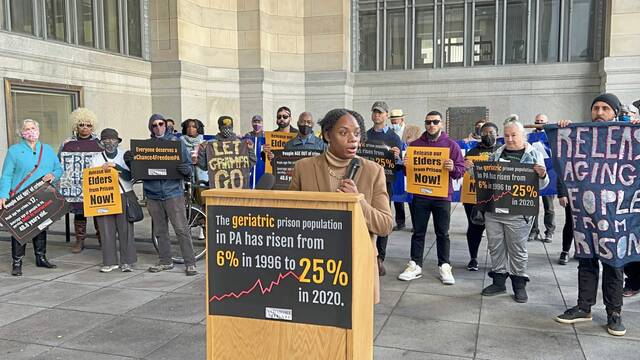https://triblive.com/news/pennsylvania/pa-lawmakers-look-to-expand-parole-eligibility-for-aging-sick-inmates/
Pa. lawmakers look to expand parole eligibility for aging, sick inmates

Avis Lee, convicted of second-degree murder for serving as the lookout in a robbery-turned-fatal shooting, served 40 years, six months and 12 days in prison.
In February, Pennsylvania Gov. Tom Wolf commuted her sentence of life without the possibility of parole to life with parole. She was released from prison nine months ago.
On Friday, Lee joined a group of dozens of criminal justice reform advocates on the steps of the City-County Building in Downtown Pittsburgh to urge the passage of Senate Bill 835, which would allow anyone over the age of 55 who has served either 25 years or half of their sentence — whichever comes first — to become eligible for parole.
The bill also would allow incarcerated people with a chronic medical condition — either physical or mental illness — to be eligible for parole.
The bill would not guarantee early release.
It was referred to the judiciary committee in August. A similar bill has not yet been introduced in the House.
“People will die unnecessarily in those prisons if they are not released,” Lee said. “They’re aging. They’re getting very sick.”
She recounted a time in prison when she would play volleyball or jog around the half-mile track with women who were incarcerated with her.
“In the later years, I pushed them around that same track in wheelchairs because they were aging and their health was deteriorating,” Lee said.
She had two roommates with breast cancer who died in prison because they could not get compassionate release.
“This bill is so important to give those same women an opportunity of freedom that I was given,” she said.
State Sen. Camera Bartolotta, R-Washington, is a co-sponsor of the bill. She said that Pennsylvania’s current compassionate release program doesn’t work. To qualify, Bartolotta said, an incarcerated person must both be non-ambulatory and have a terminal diagnosis.
“We have made this criteria nearly impossible to qualify for,” she said.
In Pennsylvania from January 2010 through June 2015, only nine people were released under the program, Bartolotta said.
“Not only is this current system not compassionate, but it is extremely and unnecessarily expensive,” Bartolotta said.
She said that the cost to keep an incarcerated person in skilled care or personal care units in the state prison system is $500 per person per day.
“Most are incapacitated and not a security threat at all,” she said.
Both Bartolotta and State Rep. Summer Lee, D-Braddock, emphasized the bipartisan nature of the legislation.
“This bill is not just about compassion. It’s about common sense, fiscal responsibility,” Summer Lee said. “Most, it is about restoring and living up to our ideals as a nation and how we treat the most vulnerable, the most marginalized among us.”
“The United States has a mass incarceration problem, and Pennsylvania is its leader. We are keeping people behind bars who pose no threat any longer to our society.”
State Rep. Sara Innamorato, D-Lawrenceville, said that the United States is an outlier in the world for allowing death by incarceration. She said that Pennsylvania has the second-highest number of people in the country serving a sentence of life in prison with no chance for parole. Approximately 70% of those people are Black, and most are older than 40. They were prosecuted from crimes that occurred in their teens and early 20s, she said.
“Prisons should not be nursing homes,” she said. “Not only is there no public safety benefit to their continued incarceration, but our state sentencing policies are depriving communities of the valuable mentorship of incarcerated elders who are senselessly trapped in cages — no matter how many programs they’ve participated in, how many times they’ve asked for forgiveness or how many of their fellow inmates they’ve helped mentor.”
Copyright ©2026— Trib Total Media, LLC (TribLIVE.com)
